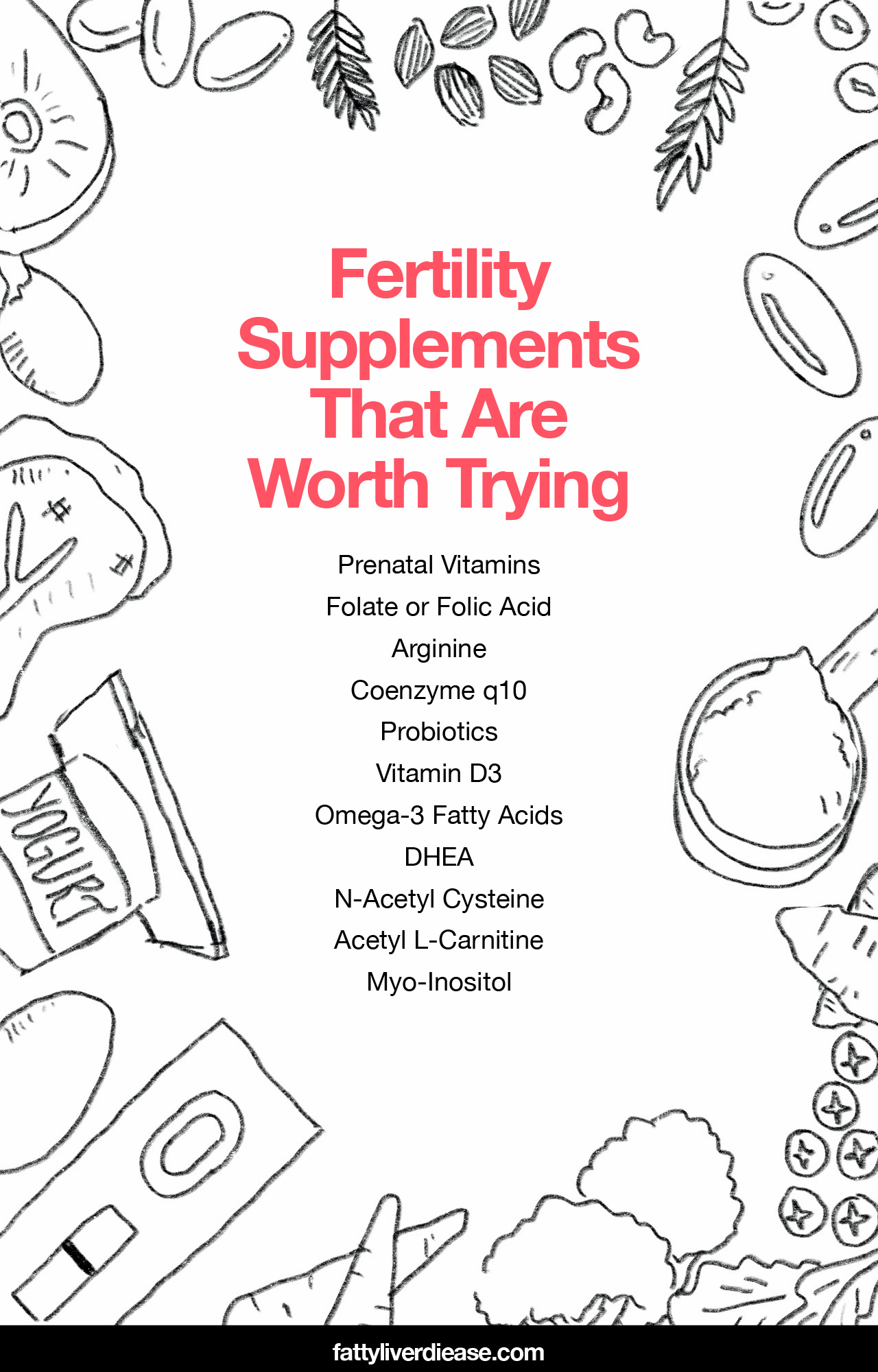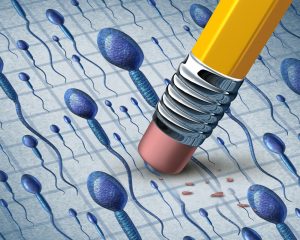At first glance, getting pregnant may seem really easy. What few people realize is that so many factors need to align in order for a pregnancy to occur. The female’s egg needs to be mature, released from the ovary, and on its way to the uterus. The timing must be just right so that a male’s sperm meets the egg in the fallopian tube or uterus. Egg quality and sperm quality influence the likelihood that a pregnancy will occur. Beyond that, so many other factors like systemic inflammation, hormone levels, and stress levels play a part in whether a pregnancy will take place.
This is when diet and supplements come into play. Eating the right foods and determining the right supplement regimen can help you boost your fertility and enhance your chances of getting pregnant. Diet and fertility supplements also work synergistically with fertility treatments to give you the best possible chance of getting pregnant.
Fertility Supplements That Are Worth Trying
Though there are not magic vitamins to get pregnant fast, there are supplements that support reproductive health. Depending on your specific needs, fertility supplements may be an additive strategy along with a healthy, balanced diet and medical interventions. Common medical interventions you may be undergoing include in vitro fertilization (IVF)
Here are some science-backed supplements that may play a role in promoting fertility.
Prenatal Vitamins
When looking for supplements that support fertility, one of the primary vitamins that specialists will recommend is prenatal vitamins. But wait, aren’t prenatal vitamins intended for use during pregnancy? Yes, but they are also important for promoting women’s reproductive health before conception to help get your body prepped to carry a baby. Prenatal vitamins are a type of multivitamin that fills in any nutrient gaps you might have that could be contributing to issues getting pregnant.
When looking for a good brand of prenatal vitamins, make sure to choose vitamins that contain a balance of micronutrients such as vitamin E, vitamin C, B vitamins, vitamin D, iron, folate or folic acid, and calcium.
Folate or Folic Acid
You may be familiar with the importance of folic acid in prenatal vitamins. An article published in Reviews in Obstetrics and Gynecology provides information from a registered dietitian regarding the best kind of folic acid. (1)
While many prenatal vitamins contain folic acid, folate is actually the more bioavailable form of folic acid. This means that your body is more able to readily absorb and utilize folate wherever it’s needed in the body. This doesn’t mean that folic acid is useless. Before folic acid can be used, your body must first process it into folate. This works just fine for most women. However, some women may have a genetic trait that inhibits the conversion of folic acid into folate, which may interfere with fertility or fetal health.
Folate is so critical for reproductive health and the health of a developing fetus because it ensures that the neural tube develops properly, which is critical for a healthy brain and spinal cord.
Arginine
Arginine is an amino acid that is regarded as a conditionally essential amino acid. This means that the body is able to synthesize its own arginine, but under certain conditions, the body benefits from dietary sources of arginine.
Preparation for pregnancy may be one of the circumstances in which an arginine supplement is helpful. A clinical trial published in Human Reproduction assessed 34 women who were undergoing fertility treatments. Patients were assigned to two groups: group 1 underwent fertility treatment with no supplementation, while group 2 was supplemented with L-arginine. In comparison to the control group, the group supplemented with L-arginine had more oocytes and embryos. Three patients in the supplemented group became pregnant, while no patients in the control group became pregnant. Researchers concluded that arginine may play a role in facilitating pregnancy by increasing ovarian function and uterine receptivity to an implanting embryo. (2)
Coenzyme q10
Coenzyme q10, also known as coq10, is an antioxidant supplement that shows promise in helping enhance fertility. A study published in Reproductive Biology and Endocrinology revealed that coq10 supplementation may be particularly helpful for women who are unresponsive to ovarian stimulation. (3) Ovarian stimulation treatments are fertility treatments that facilitate the maturation of eggs as well as ovulation. (3) However, women who are unresponsive to such treatments tend to have fewer and lower-quality eggs, as well as a lower likelihood of embryo transfers. (3)
The research study evaluated 169 women, sorted into a control group and a group supplemented with coq10. (3) Results found that women who had received coq10 had more eggs, higher-quality eggs, and a higher likelihood of fertilization in comparison to controls. (3)
Probiotics
Probiotics are good bacteria that reside in the digestive tract and feed on food particles that we eat. You may think that probiotics don’t have much influence on fertility. Besides, how does the digestive system influence the reproductive system? Though it may seem like the digestive system is completely separate from other organ systems, it turns out gut health and the makeup of the microbiome play a big role in modulating inflammation throughout the body.
Having good bacteria in your digestive tract helps ensure that these bacteria feed on healthy food and produce anti-inflammatory byproducts. These byproducts travel through the bloodstream, delivering anti-inflammatory compounds to all tissues and organ systems, including the reproductive system. Taking a daily probiotic can help your body reduce systemic inflammation, thereby helping regulate your cycle and ensuring that your uterus is an ideal environment for a developing fetus.
Probiotics are also directly helpful for supporting vaginal health. The vagina contains a balance of good bacteria that help maintain homeostasis. In some instances, disruption in the natural balance of vaginal flora leads to the overgrowth of yeast, resulting in a yeast infection that may influence sperm’s ability to reach the uterus to fertilize an egg. Taking a daily probiotic can help maintain a pH and balance of microorganisms that support sperm movement.
Vitamin D3
Vitamin D3 is a vital nutrient that helps fortify your immune system and support healthy immune responses. Vitamin D3 is involved in strengthening the skeletal systems, supporting muscle synthesis, protecting against inflammatory diseases, and supporting the healthy expression of genetic traits. With the variety of roles that vitamin D plays, it might not be surprising that vitamin D3 is even associated with improved fertility!
A study published in Fertility and Sterility examined pregnancy rates among 132 women who either met or did not meet the estimated average requirement for vitamin D. (4) The number of pregnancies, births, and the likelihood of conceiving was higher among women whose vitamin D levels were at or above the recommended level, in comparison to women whose vitamin D levels were below the recommended level. (4)
Omega-3 Fatty Acids
Omega-3 fatty acids exert powerful anti-inflammatory effects on the entire body. EPA and DHA are the primary types of omega-3 fatty acids that exert significant anti-inflammatory effects on the body. While ALA is a type of omega-3 fatty acids that also exerts anti-inflammatory effects, the body converts ALA to more useable EPA and DHA forms. Taking omega-3 fatty acid supplements is most effective when in the form of EPA and DHA. To get this kind of omega-3 fatty acid, fish oil supplements are ideal. Look for high-quality fish oil supplements in the form of capsules or liquid.
Omega-3 fatty acids have been shown to improve cellular functions throughout the body, from the liver to insulin function. Supplementing with omega-3 fatty acids may also help reduce inflammation associated with endometriosis.
DHEA
DHEA stands for dehydroepiandrosterone and is a hormone that is produced naturally in the body. There is some evidence that taking DHEA may be particularly beneficial for women who are in their later 30s or in the second half of the child-bearing age window. Taking DHEA may help combat ovarian aging by helping preserve the ovarian reserve, which is the ovary’s capacity to produce mature eggs that are ready for fertilization. However, research points out that the DHEA needs to be studied further in order to confirm its therapeutic effects on fertility. (5)
N-Acetyl Cysteine
N-acetyl cysteine, also known as NAC, exerts potent anti-inflammatory and antioxidant activity. Supplementing with NAC helps resolve metabolic issues contributing to underlying hormonal issues such as polycystic ovary syndrome (PCOS). The antioxidant activity of NAC also helps regulate insulin activity and re-establishes hormonal balance. In a study published in Obstetrics and Gynecology International, women supplementing with NAC had an increased likelihood of pregnancy and ovulation when compared to women taking a placebo. (6)
Acetyl L-Carnitine
Acetyl L-carnitine and L-carnitine are powerful antioxidants that seem to play a large role in mitigating female infertility. A study published in Reproductive Biology and Endocrinology describes how acetyl L-carnitine has potent antioxidant effects, while L-carnitine has therapeutic effects on the mitochondria in cells. (7) Supplementing with these compounds may help improve the quality of oocytes by scavenging free radicals responsible for oxidative stress and by promoting healthy energy production. (7)
Myo-Inositol
Myo-inositol is a compound that is similar to the B vitamin group and plays a role in regulating fat and sugar metabolism. Researchers at the Fujian Medical University in China have found that supplementing with myo-inositol improves the likelihood of becoming pregnant. (8)
Diet Tips for Promoting Fertility and Reproductive Health
If you don’t eat the right foods, supplements alone cannot help you get pregnant. Supplements are much more effective for increasing fertility when added to a diet plan that includes healthy, anti-inflammatory foods.
Here are some critical facets of a healthy diet that supports fertility.
Fruits and Veggies
Eating an abundance of fruits and vegetables is a significant foundation of a healthy, fertility-promoting diet. Fruits and veggies are packed with antioxidants like polyphenols and carotenoids that fight against oxidative stress inflicted by chemicals, pollutants, and unhealthy foods that produce harmful free radicals. Oxidative stress is a major contributory factor to hormonal imbalances and conditions underlying fertility, like PCOS and endometriosis.
So, how do the antioxidants in fruits and veggies work? Polyphenols and carotenoids interact with free radicals to chemically neutralize them, making it easier for cells to clear our waste products and operate more efficiently.
More efficient cellular function means a healthier reproductive system: healthier ovaries, higher egg quality, and a uterus that provides a healthier environment for a growing baby.
When striving to eat fruits and veggies to support fertility, reach for produce like blackberries, blueberries, raspberries, pomegranate, sweet potatoes, kale, broccoli, spinach, bell peppers, and carrots.
Getting Enough Protein
Getting plenty of protein is important during nearly all stages of life. So, why is protein so important? Protein is made of smaller compounds called amino acids, which are used in a variety of physiological processes including muscle synthesis, hormone production, and immune response. There is evidence that it may be particularly important for reproductive health. A study examining animal models found that essential amino acid requirements increase significantly at certain times during pregnancy. (9)
Getting adequate amounts of high-quality protein as you prepare for pregnancy can help make your body a welcoming place for a growing baby, and potentially make it more likely that your body will welcome and support a pregnancy.
So, what exactly is high-quality protein? High-quality protein provides ideal ratios of essential amino acids. Essential amino acids – or indispensable amino acids – are building blocks of protein that the human body requires from dietary sources on a daily basis. The body needs optimal ratios of essential amino acids on a daily basis in order to build muscle tissue, skin tissue, hormones, and enzymes to carry out all biological processes. Essential amino acids contrast with nonessential amino acids, which the human body can synthesize internally.
Where can you get these essential amino acids? You can get essential amino acids from nearly all protein sources. However, the catch is that not every protein source contains ideal ratios of essential amino acids.
All animal protein sources contain optimal ratios of essential amino acids in a single source. For example, milk, cheese, eggs, yogurt, chicken, steak, and fish all contain optimal ratios of essential amino acids. When choosing animal products, make sure to choose those that are as unprocessed as possible and low in saturated fat.
If you are a vegetarian or vegan, rest assured that you can also get the essential amino acids that you need from plant-based sources. The one catch is that unlike animal protein, a single plant protein source does not supply all of the essential amino acids that you need. Instead, it’s important to consume a variety of plant-based foods throughout the day to get ideal ratios of essential amino acids to support all physiological functions. For example, incorporate beans, nuts, seeds, and whole grains into each meal.
Get Plenty of Omega-3 Fatty Acids
Just as you can take omega-3 fatty acids in supplement form, you can also get omega-3 fatty acids from the foods that you eat. You can incorporate lots of omega-3 fatty acids in your diet, regardless of whether you are a vegetarian or a meat-eater. The foods rich in omega-3 fatty acids exhibit highly anti-inflammatory activity and support reproductive health.
So, what foods should you incorporate into your diet in order to get lots of omega-3 fatty acids? If you follow a primarily plant-based diet, you can get omega-3 fatty acids from nuts and seeds like walnuts, pecans, flaxseeds, and chia seeds.
If you are a meat-eater, you can get plenty of omega-3 fatty acids from foods like salmon, mackerel, tuna, and sardines. Keep in mind that during pregnancy, your doctor and dietitian may suggest avoiding certain fish or to keep your fish servings to a minimum. This is because certain fish may have trace amounts of heavy metal deposits that can be harmful to a growing baby. Just be sure to consult your doctor to make sure your diet and supplement regimen is tailored to fit your needs, to ensure that you have a healthy pregnancy.
Steer Clear of Saturated Fat
The consumption of saturated fat over time leads to high levels of inflammation, weight gain, and insulin resistance, which contribute to hormonal imbalances that may impede conception. Removing saturated fat from your diet will allow your body to fight oxidative stress and inflammation, while normalizing hormone levels that support a healthy reproductive system. On top of that, reducing saturated fat in your diet can also help keep your cholesterol levels low and fight against the risk of heart disease.
To stay away from saturated fat, cut down on your consumption of red meat, pork, and processed meats. When eating dairy products, always choose low-fat and skim products.
Cut Down on Added Sugars and Refined Grains
Added sugars are one of the major culprits when it comes to metabolic and hormonal health. Eating an abundance of added sugars increases the risk of weight gain, type 2 diabetes, and insulin resistance, all of which increase inflammation and throw off hormone levels. To decrease inflammation and maintain healthy hormone levels, steer clear of added sugars. It’s recommended to get no more than 10 grams of added sugar on a daily basis, and if possible, fewer than 10 grams.
To keep the amount of added sugars at a minimum, stay away from foods like granola bars, sugary breakfast cereals, cookies, cakes, ice cream, and pastries. Before using condiments and salad dressing, always check the ingredients label to make sure there are no hidden grams of added sugar.
The body’s process for digesting refined grains is the same as that for digesting added sugars. Refined grains are grains that have had the nutritional part removed. For example, brown rice undergoes an industrial process to remove the hull which is packed with fiber, protein, and antioxidants. The resulting product is white rice, which lacks all of these critical nutrients. When we eat white rice, the body immediately breaks down the carbohydrates into glucose molecules that are absorbed into the bloodstream, spike blood sugar, and over time contribute to insulin resistance. Essentially, when we eat refined grains, we are eating sugar.
To limit the amount of refined grain in your diet, stay away from white rice, white pasta, white bread, and anything with refined flour.
Precautions and Things to Keep in Mind
All dietary supplements are available over-the-counter at vitamin stores and your local drug stores. Bear in mind that supplements are not evaluated by the Food and Drug Administration (FDA) for quality and safety. As a result, many supplements contain various ingredients or preservatives that are not necessarily healthy or helpful for conceiving. In order to avoid taking unnecessary ingredients, it’s important to choose high-quality supplements. Before adding any supplements to your regiment, always consult your doctor and a registered dietitian to make sure that your diet and supplement plan best supports your specific conditions and health needs.
A Note About Male Fertility
In this article, we’ve focused primarily on the impact of certain foods and supplements on female fertility. However, it’s equally likely that lack of conceiving is due to an issue with male fertility, such as sperm count, sperm quality, and sperm motility, instead of egg quality or quantity. Though it’s sometimes overlooked, male infertility is just as likely to be the reason why a couple is experiencing issues getting pregnant. Check out our other articles for information on how to boost male fertility, including male fertility supplements and diet tips.
Conclusion
Dealing with infertility or difficulty getting pregnant can be daunting and frightening, and you may not know where to start. However, it’s important to know that you’re not alone, and many couples struggle to get pregnant. Thankfully, there are medical treatments as well as steps you can take at home in order to improve your reproductive health. Whether you have been struggling with infertility or just want to increase your chances of getting pregnant, there are diet tips, fertility supplements, and vitamins to help you get pregnant. Before starting a new regiment, always consult your physician about which supplements and vitamins support your specific needs.

References:
(1) https://www.ncbi.nlm.nih.gov/pmc/articles/PMC3250974/
(2) https://pubmed.ncbi.nlm.nih.gov/10402369/
(3) https://www.ncbi.nlm.nih.gov/pmc/articles/PMC5870379/
(4) https://www.ncbi.nlm.nih.gov/pmc/articles/PMC5545066/
(5) https://www.ncbi.nlm.nih.gov/pmc/articles/PMC4534532/
(6) https://www.ncbi.nlm.nih.gov/pmc/articles/PMC4306416/
(7) https://www.ncbi.nlm.nih.gov/pmc/articles/PMC5785901/























